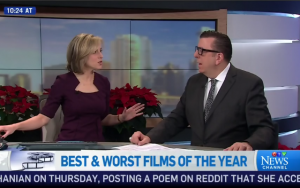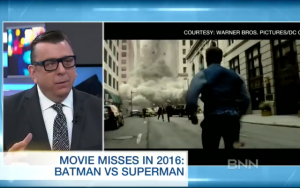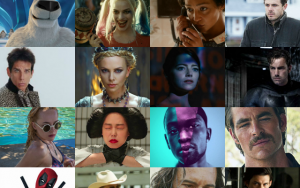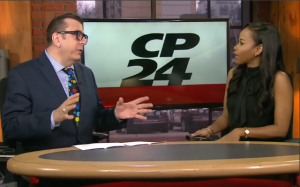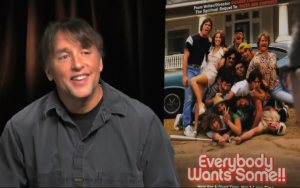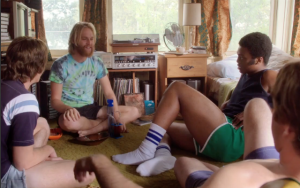Richard’s 2016 Picks: Lee and Randi, Ryan and Emma and Deadpool.
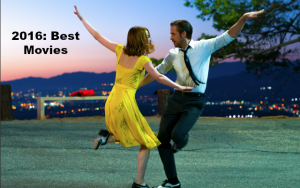 Any year that gives us the day-to-day quest for beauty of “Paterson,” the wild eroticism of “The Handmaiden” and everything in between can’t be all bad. Sure, there were some stinkers and celebrity mortality galore, but when I think back on 2016 I’ll remember Lee and Randi unexpectedly meeting on the street, Ryan and Emma’s Mulholland Drive extravaganza, Lord Voldemort getting down to disco era Rolling Stones and the undeniable belief that every page is a possibility.
Any year that gives us the day-to-day quest for beauty of “Paterson,” the wild eroticism of “The Handmaiden” and everything in between can’t be all bad. Sure, there were some stinkers and celebrity mortality galore, but when I think back on 2016 I’ll remember Lee and Randi unexpectedly meeting on the street, Ryan and Emma’s Mulholland Drive extravaganza, Lord Voldemort getting down to disco era Rolling Stones and the undeniable belief that every page is a possibility.
- A Bigger Splash: In 1969 the Alain Delon potboiler “La Piscine” (“The Swimming Pool”) had a look at beautiful people and sexual jealousy set against the backdrop of the Côte d’Azur. Forty-five years later director Luca Guadagnino makes the story his own, transplanting the characters to a remote island halfway between Sicily and Tunisia, replacing jealousy with desire and setting the whole thing to the slinky beat of The Rolling Stones’ “Emotional Rescue.” “A Bigger Splash” keeps the swimming pool but reinvents the rest of the story.
Rock star Marianne Lane (Tilda Swinton) and her boyfriend Paul (Matthias Schoenaerts) are living a quiet life on the coast of Italy. Very quiet. She is recuperating from surgery and can’t speak. Their tranquil time, however, is shattered by the arrival of Harry (Ralph Fiennes), Lane’s former record producer and lover, and his Lolita-esque daughter Penelope (Dakota Johnson). He’s an impulsive first-one-in-the-pool, free spirit who invites strangers over to hang out (“You’re not speaking sweetheart so I had to make other plans!” he says.), she’s a flirty presence who says things like, “My trouble is, I fall in love with every pretty thing.” A day or so into the visit the sunny Mediterranean days take a dark turn as their shared history brings up some ghosts from the past.
“A Bigger Splash” is worth the price of admission just to see Ralph Fiennes, Lord Voldemort himself, strutting his stuff to disco era Rolling Stones. He unleashes some of the goofiest dance moves since Elaine Benes in what must be his loosest performance ever.
Come for the dancing, stay for the bawdy and boisterous atmosphere. The idyllic, sun dappled backdrop plays at odds with the noirish story as Guadagnino brushes his canvas with sexual tension, slowly adding layers to the story as he builds up to a startling climax. It’s a romp, with worldly people, loads of nudity, drugs and drinking, until it isn’t and the time comes to pay the price of living a wild life without regrets. As the characters manipulate one another Guadagnino manipulates the audience with flamboyant filmmaking, unexpected jump cuts and zooms, which demand your attention.
“A Bigger Splash” could have swum in the shallow end of the pool, but subtly and interestingly goes off the deep end.
- Deadpool: Don’t expect the usual kid-friendly superhero fare from “Deadpool.” He’s part of the Marvel family, a distant cousin to Iron Man, The Hulk and Captain America, but he’s a superantihero, a weaponized bad attitude come-to-life with a chip on his shoulder and a raunchy quip on his lips.
“Deadpool” is unlike any other origin story. It’s a snarky, violent, fourth-wall-breaking collision between “Van Wilder” and Marvel Comics. The opening credits–which scream the movie stars God’s Perfect Idiot, A Hot Girl, A British Villain, A CGI Character and features a Gratuitous Cameo–set the tone. This isn’t your grandfather’s superhero movie. With one bloody shot across the bow “Deadpool” makes the other Marvel movies look a little less Marvel-ous. No joke is too crass. No lines are left uncrossed. Where the last couple of Marvel superhero films have felt like odes to market research, “Deadpool” feels like an antidote to the repetition of recent superhero offerings. Politically incorrect and rowdy, it’s a down-and-dirty movie that has more in common with “The Toxic Avenger” than “Iron Man.”
This may be the role Reynolds has been waiting for. It mixes-and-matches his skill at dropping a one liner with his physical side and finally gives his bland leading man mien some edge. Self-effacing, he pokes fun at his other attempts at superhero notoriety. “Please don’t make this super suit green or animated,” says the former Green Lantern and suddenly we forgive his past transgressions.
“Deadpool” won’t be for everyone. It’s occasionally a little too rude and crude, bloody and bowed for it’s own good but at least it tries to do something a little different in the well-worn context of the superhero genre. It exists in a meta universe where Deadpool is aware he’s in a movie–“Whose BLEEP did I have to BLEEP to get my own movie?” he asks.–while another character suggests the name Deadpool “sounds like a franchise.” I hope so. Like them or not, superhero movies aren’t going anywhere soon but at least every now and again there may be a new “Deadpool” film to shake things up a bit.
- Everybody Wants Some: Director Richard Linklater’s last film, the Oscar wining “Boyhood,” was a slice of life that showcased twelve years in the life of a growing boy. His new movie is also a slice of life but in a much-condensed form, spanning just three days in the life of a college baseball player.
Largely conflict free, this isn’t a story so much as it is a snapshot of a time and place. It’s a transport back to the time of waterbeds, “My Sharona,” fashionable mullets and trippy Carl Sagan cosmology. Linklater recreates the freewheeling feel of the era and the last blast of childhood before the responsibilities of adulthood. The temptation will be to label this a more innocent time, but that isn’t exactly accurate. These guys are just as interested in scoring with girls as they are soring runs on the field so innocent they are not. At most this is an affectionately nostalgic glimpse back into our recent past.
“Everybody Wants Some!!” is a charming reminiscence. Linklater gets the details right—including a crude warning against the pleasures of waterbed sex—but more importantly populates the film with characters that feel like real people and not stereotypes conjured up by a 1980s way-back machine. It’s troubling that the female characters are given little to do—perhaps Linklater’s next could be from the point of view of the woman’s experience—but the men are entertaining and compelling sorts whose conversations are occasionally inane, occasionally philosophical, just like real life.
- The Handmaiden: Set in 1930s Korea, “The Handmaiden” is an epic story of madness, con games, double crosses, double-double crosses, kinky sex, desire and more. Director Chan-wook Park adapts Welsh writer Sarah Waters’ novel “Fingersmith,” wringing every ounce of lascivious pleasure from its sprawling story of sex and intrigue.
Chan-wook Park’s films have never shied away from lurid, sensational imagery, and “The Handmaiden” is no different. Unapologetically erotic and convoluted, the film revels in its ridiculousness, luxuriating in every plot twist and turn. Told from multiple points of view with an ever-changing character dynamic, it demands your attention.
What begins as a con game ends as a (SPOILER ALERT) a triumph of undervalued women who use the manipulation of the men in their lives as a weapon. It’s a complicated revenge story, ripe with detail and secrets. As vaguely trashy art house cinema goes, however, it doesn’t get much more enjoyably escapist than “The Handmaiden.”
- Hell or High Water: The real stars of the new neo-western “Hell or High Water” aren’t the top line cast, Chris Pine, Ben Foster and Jeff Bridges. All are terrific, but the main attractions are the Fast Cash and Debt Relief signs that dot the West Texas landscape. They’re the reason we’re here and the engine that propels this story of outlaws, buddies and banks.
Echoes of the Coen brothers ricochet throughout “Hell or High Water.” Aside from Coen regular Bridges, the movie exists in an amoral universe populated by down-on-their-heels types, done in either by poor life decisions, circumstance, age or temperament. English director David Mackenzie places these characters amid sun bleached landscapes and the hardened faces of citizens asserting their Second Amendment rights. It feels like the Coen Brothers but only because Joel and Ethan has visited this nihilistic comedy territory several times before. Mackenzie hasn’t simply made “No Country For Old Men Lite,” he’s combined interesting characters with a languid pace that apes the speed of life in West Texas to create a potent portrait of a time and place.
Set against the backdrop of West Texas’s perpetual economic downturn and those ever-present Fast cash signs, it’s a story not just about the four men but the circumstance that pitted them against one another.
“Hell or High Water” is two buddy movies in one. As one of the brothers Foster is reliable in his familiar man-on-the-edge role, but it is Pine who impresses. He underplays Toby, never doing more than he has to and avoiding the theatrics of his “Star Trek” films. It’s a career best performance that shows there is more to him than larger-than-life franchise work.
As the heavy-breathing lion in winter Bridges brings both gravitas and a light touch. His skill as a Ranger is evident but so is his offbeat sensibility. “Now that looks like a man who could foreclose on a house,” he says when meeting a recently robbed bank manager. It’s a throwaway line but Bridges brings it to life in a way that made me wonder if there is a more comfortable presence on screen than Bridges? He is matched in ease and charm by Birmingham who is a perfect foil for Bridges.
With its unhurried, deliberate pace Nick Cave’s suitably moody score and Mackenzie’s eye for detail “Hell or High Water” is more than a stop-gap between Coen Brothers neo westerns, it’s one of the most richly satisfying movies of the year so far.
- La La Land: “La La Land” reinvents the traditional big screen musical by playing it straight. The original songs and new story feel like something Gene Kelly would approve of but not quite recognize as the form he helped perfect in Hollywood’s Golden Age.
The real and the unreal collide in a film that values naturalism in an unnatural genre. Mia and Sebastian burst into song, dance on city streets but do so in the most unaffected of ways. It looks and feels like an old-school musical—the camera dances around the actors and it’s always magic hour—but Stone and Gosling are very contemporary in their approach to the material. Woven into the romantic, joyful script are real comments on the setting—“That’s LA, they worship everything,” says Sebastian, “but value nothing.”—a sense of the pleasure and pain that accompany passion, whether its for a person or a career and melancholy when things don’t quite work out. It’s a movie that dances to it’s own beat. By times bright and garish or atmospheric and moody, it’s never less than entertaining.
Gosling is a charming leading man and equal match for Stone whose remarkable face and expressive performance give the movie much of its heart. Director Damien Chazelle is clearly smitten with his leading lady, allowing his camera to caress her face in long, uninterrupted close-ups.
From a trickily edited opening song-and-dance number in a traffic jam to a spectacular dance among the stars to heartfelt human feelings, “La La Land” doesn’t just breathe new life into an old genre it performs CPR on it, bringing its beating heart back to vibrant life.
- Loving: Imagine falling in love with someone, getting married and having a baby or two. For many people that is the dream but for interracial couple Richard and Mildred Loving it was a nightmare of racism and injustice.
“Loving” is an important slice of American history told in a quiet, heartfelt way. Director Jeff Nicholls doesn’t clog up the story with dialogue. Instead he follows the first rule of filmmaking, show me, don’t tell me. For instance, when Mildred and Richard leave Virginia for the less-than-bucolic DC, the looks on the actor’s faces tell the tale, no words required. He allows the performances to underscore the potency of the story. Watch the way Mildred and Richard respond to one another physically after the arrests. Their tentative public displays of affection shows the fear that comes along with being told your relationship is illegal and wrong. It’s subtle, beautiful acting.
“Loving” is a understated movie. Some have suggested it may have benefitted from a bit more anger, but that, for me, would feel like a betrayal to the characters who fight the good fight with dignity and love.
The movie is simultaneously a powerful look at a different time and, when it asks, “What is the danger to the state of Virginia from interracial marriage?” a timely and universal reminder that Loving v. Virginia was just one of many steps humanity has to take before everyone is afforded fundamental rights.
- Manchester by the Sea: “Manchester by the Sea” is one of the year’s best films. If you want to know why, read on. If not, go buy a ticket now. You won’t be disappointed.
“Manchester by the Sea” is many things. As a finely acted look at grief and the aftermath of heartbreak, it has few peers among this year’s crop of films. But it’s also very a funny odd couple/buddy flick that isn’t afraid to flip flop between drama and comedy. This is writer/director Kenneth Lonergan’s tempest in a teapot, a smallish film that roils with big emotional moments.
Casey Affleck is the core of the film. He’s in virtually every frame and while understated he bristles with feeling. It is a tremendous performance that never fails into morbidity as he skilfully keeps he character alive, both physically and metaphysically. Every day is a struggle for Lee and he deals with his trauma the only way he knows how, with blistering honesty and by drinking and fighting to feel something. There is emotional truth in every mumbled line and come Oscar season expect to hear a lot about this performance.
Affleck shares several scenes with Michelle Williams, but one in particular stands out. For most of the film we only see her in flashbacks, when she was married to Lee. Cut to present day and a chance encounter on the street. In a master class of acting the two rehash and come to grips with the trauma that tore them apart. It heartbreak laid bare and it is a stunning scene.
I fear I’ve made “Manchester by the Sea” by the sea sound like an exercise in Sturm und Drang but it’s not. It deals with very real, very difficult human situations but does so with honesty and a great deal of unexpected humour and wisdom.
- Moonlight: “Moonlight” is a film about a young man trying to find a place for himself in the world. “At some point you got to decide who you going to be,” says an early mentor. “Can’t let anybody make that decision for you.” Director Barry Jenkins splits the story into thirds, each examining a different time in the life of Chiron, a young, gay African-American man, as he comes to grips with who he is.
“Moonlight” is a movie that beats with a very human heart while subverting expectations with almost every scene. Jenkins has placed obstacles in the way of the story telling—multiple actors playing the same characters, and a lead who is succinct almost to the point of being mute—but overcomes those hurdles with a combination of social conscience, fine acting and interesting characters who constantly defy pigeonholing.
Mahershala Ali, an actor best known as Remy Danton on “House of Cards,” is a standout as a drug dealer who allows the personal cost of his business to weigh on him. He’s a tough guy with a heart and his performance in Part I sets a high bar which is met by Harris and all three of the young men who play Chiron.
Each deliver performances characterized by deep inner work that reveals the truth behind the façade Chiron uses as a front. There’s a remarkable consistency in the trio of performances, so by the end of the film, when Chiron is asked, “Who is you man?” his answer, “I’m me. I don’t try to be nothing else,” rings true and real.
- Paterson: The Jim Jarmusch movie is a week in the life of Paterson, the man and the place.
Adam Driver is Paterson, a poetry writing New Jersey bus driver from Paterson, New Jersey. He lives with Laura (Golshifteh Farahani), a dreamer who wants to open a cupcake shop and make them rich or, maybe, become a country singer and their dog Marvin.
“Paterson” is a wonderfully leisurely movie. It’s not in a hurry to get where it is going, instead luxuriating in the mundane aspects of Paterson’s life punctuated by on-screen depictions of his poetry. What could have been insufferable turns into a beautifully rendered portrait of people who find beauty and art in every day life.
There are small conflicts sprinkled throughout, a bus breaks down and lovers quarrel, but “Paterson” isn’t about that. It’s about gentle, loving performances from Driver and Farahani and the beauty of overheard conversations and the day today of regular life.
